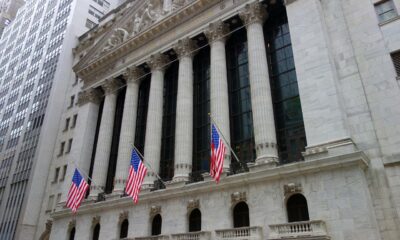Business
BBVA Crashes on the Stock Market, While Sabadell Rises Strongly on the Ibex 35
BBVA surprised the market with a potential hostile takeover bid for Sabadell, contingent on obtaining over 50% shareholder attendance. This triggered fluctuations in both banks’ stock prices. While Sabadell initially gained post-offer, it reversed after rejecting the merger. BBVA suffered significant losses since announcing the offer, prompting concerns about further premium increases.

It was one of the few options left to BBVA and Carlos Torres and they executed it. Although the market was not contemplating a hostile takeover bid to control Sabadell, the entity surprised this Thursday and informed the National Securities Market Commission (CNMV) of a new operation that will only go ahead if more than 50% of the company’s shareholders company directed by Josep Oliú attends the offer.
The new episode of love-hate between BBVA and Sabadell has meant that the prices of the two Ibex 35 companies have suffered new fluctuations. Specifically, the two entities have presented themselves as the two main protagonists of the day and the entity led by Carlos Torres is the red lantern with drops that exceed 6%. For its part, the Catalan company is recording increases of close to 5%.
On April 30, BBVA launched an offer to Banco Sabadell for a merger
At that time, the entity chaired by Carlos Torres fell sharply, while Banco Sabadell rose. The same movement that the two entities are registering this Thursday. Last Monday, Sabadell announced its rejection of BBVA’s “unsolicited” offer and the tables turned. That is, BBVA rose strongly and the Catalan entity fell.
If translated into euros, from the day of the offer until the closing of May 6 (before the rejection of the offer), Sabadell earned more than 800 million euros on the stock market . However, since the rejection of the merger until this Wednesday, the Catalan entity has fallen and has lost 489 million euros.
However, this situation has changed with the rise that Sabadell is registering this Thursday. With this recovery, since the rejection the Catalan bank has “only” lost 1% and in absolute figures it represents 100 million euros of losses, but if the date on which BBVA launched the offer is taken into account, the profits amount to more of 700 million euros.
As for BBVA, the entity fell sharply when it announced its offer. From that day until Monday, May 6, he lost 6,188 million euros on the Ibex . A situation that bothered Sabadell, since he reproached him for “the volatility” in the statement in which he rejected the merger. But this Thursday’s collapse aggravates BBVA’s situation on the Ibex 35. Since the day it launched the merger, the entity has fallen more than 12%, which translates into a loss of more than 7,000 million euros.
It was also a point that Torres took into account in the email he sent to Oliu. This drop is one of the reasons given by the president of BBVA why “there is no further possibility of an increase.” “This situation absolutely prevents us from being able to pay more premium than what we already offer, because if we did, it is foreseeable that our value would fall again (even by an amount greater than the increase in premium that we would make),” he states emphatically.
Since last May 6, BBVA had been able to recover some of what it lost in those days. Until this Wednesday, the bank rose 4.57% in two sessions, which translates into 2,627 million euros . This improvement in the stock market means that the capitalization loss would have been reduced to 3,561 million euros, almost half of what it previously lost.
__
(Featured image by rperucho via Pixabay)
DISCLAIMER: This article was written by a third party contributor and does not reflect the opinion of Born2Invest, its management, staff or its associates. Please review our disclaimer for more information.
This article may include forward-looking statements. These forward-looking statements generally are identified by the words “believe,” “project,” “estimate,” “become,” “plan,” “will,” and similar expressions. These forward-looking statements involve known and unknown risks as well as uncertainties, including those discussed in the following cautionary statements and elsewhere in this article and on this site. Although the Company may believe that its expectations are based on reasonable assumptions, the actual results that the Company may achieve may differ materially from any forward-looking statements, which reflect the opinions of the management of the Company only as of the date hereof. Additionally, please make sure to read these important disclosures.
First published in EL INDEPENDIENTE. A third-party contributor translated and adapted the articles from the originals. In case of discrepancy, the originals will prevail.
Although we made reasonable efforts to provide accurate translations, some parts may be incorrect. Born2Invest assumes no responsibility for errors, omissions or ambiguities in the translations provided on this website. Any person or entity relying on translated content does so at their own risk. Born2Invest is not responsible for losses caused by such reliance on the accuracy or reliability of translated information. If you wish to report an error or inaccuracy in the translation, we encourage you to contact us

-

 Crowdfunding1 week ago
Crowdfunding1 week agoThe Youth Program at Enzian Shooting Club Is Expanding Thanks to Crowdfunding
-

 Crypto6 days ago
Crypto6 days agoTariff Turmoil Sends Bitcoin and Ethereum Lower as Crypto Markets Face Mounting Pressure
-

 Markets2 weeks ago
Markets2 weeks agoMarkets, Jobs, and Precious Metals Show Volatility Amid Uncertainty
-

 Crypto3 days ago
Crypto3 days agoEthereum Outlook: Key $2,190 Resistance, Whale Accumulation, and Buterin’s Push for True DeFi

























